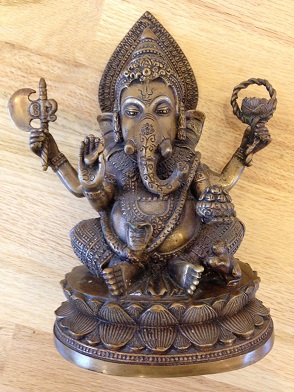
One of the distinguishing characteristics of the elephant-headed God, Ganesh, or Ganapati, is his ears. They are said to be indicative of his capacity for listening, and as well they resemble winnowing baskets, and therefore the ability to separate the wheat from the chaff.
Our ability to truly listen is fundamental to our paths as yogis and as humans. By “listening” I mean not only hearing with our ears, but accessing all our senses, and honing our ability to perceive accurately, which is tied into the winnowing process.
Think about any of conversations you have, face-to-face or electronically, and consider to what extent you truly listen. If you look closely, you’ll find that most of us are already formulating a response before the other person has completed the articulation of their thought. Often our listening is selective, we hone in on a particular point without hearing the full range of what the person is saying.
For example, I recently received an email with feedback on one of my classes. I immediately began to discount the feedback, pushing it off on the person who had the problem, justifying why I did things the way I did, etc. And I immediately began writing back with those points. But since it was an email, I had the time to first of all, reread the email and really try to understand what was being articulated. Then I started formulating a different, more nuanced response. And instead of hitting send too quickly, I again read the email and formulated several more responses before sending one that expressed appreciation for the feedback and how I would try to improve my teaching. So instead of starting a negative feedback loop, I was able to shift it into a win-win situation.
Now, I know some of you are thinking: well, sometimes it is the other person who is “off” somehow, or incorrect. Or sometimes it is hard to know, how can we figure that out?
Here is where the practice of meditation comes in. Our meditation practice allows us to begin working with our habitual patterns in a variety of ways. Meditation directly affects the old imprints stored inside, such that they become attenuated or burned off. As well, a regular meditation practice allows us to establish connection to, as Patanjali puts it, the Seer: a wiser and clearer part of our self. Having established connection with that part of our self, we can begin to access that wiser self on a moment-by-moment basis to guide us in both our understanding, and responses.
So there is a listening we can cultivate in the other direction: listening within, listening to the Seer. And in time, with practice, we can begin to truly listen and perceive the outside world from this place of deep listening to the Seer.
Nowhere is this more important than when we are facing the challenges: the obstacles and thresholds that are associated with Vigneshvara, the Lord of Obstacles as Ganesh is also known as. In those moments of challenge, or as we cross the threshold into a new domain in our lives, our ability to negotiate all of the input while standing in an awareness of our innermost self will allow us to respond in a refined and nuanced way, and from a place of love that is the essence of who we are.
My sense of the divine is that it is benevolent, and actually wants us to grow and heal, and to serve the world. And as the Lord of Obstacles, Ganesh is that energy of the divine that places exactly the obstacles and thresholds in our path that we need in order to proceed on that path of growth. Yet often when things are challenging, or challenging messages are sent, we try to combat them, or to simply ignore them. So Ganapati’s ears remind us: are we listening to what the divine is offering us?
EXERCISES
For the next week or so, in your conversations, try to truly listen.
– Can you listen and hear the other person before you begin judging or formulating a response?
– Can you create some space to respond from a place of listening and refinement, rather than reacting from you habitual patterns?
Over time, notice the effect that your practice of meditation has on your ability to listen and refine.
– Can you begin to discern the habitual patterns that cause you to want to react before you’ve had the opportunity to really listen and refine?
– Is there a shortening of the time it takes to create a refined response to a situation?
